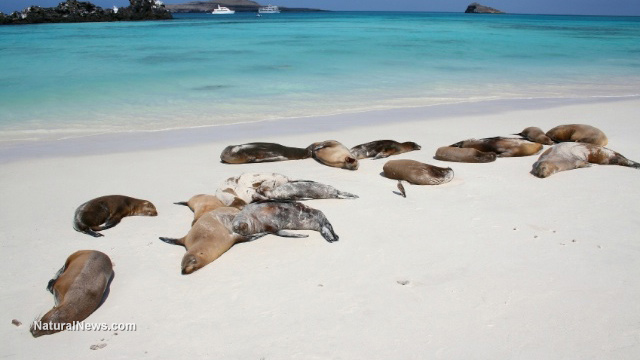Over 15,000 baby sea lions estimated dead as Pacific sea life dies off
Monday, December 14, 2015 by: L.J. Devon, Staff Writer
Tags: sea lions, Pacific Ocean, marine life

(NaturalNews) The Marine Mammal Center rescued over a hundred sea lions in a 10-day period off the West Coast of California in the winter of 2015. The influx of stranded sea lions is a sign that the health of the ocean is deteriorating. From January 1 to February 12, 2015, National Geographic counted nearly 500 rescued sea lions, an amount that is alarming scientists. Something has gone awry in the West Coast waters.
The sea lions are not finding food, they are losing strength, and many are starting to wash ashore. The startling trend didn't start in 2015. The number of stranded sea lions began rising in the winter of 2013, when scientists started noticing waves of sea lion pups washing ashore. Scientists believe the ocean's temperatures have shifted. Warmer currents may be affecting food sources that the sea lions depend on. Others see problems in ocean water acidity. The animals are being forced to go on longer quests to find food. Many of the pups are being left behind, stranded, while their parents search for food.
One-third of sea lions born last summer wiped out
The death of this sentinel species is an indication of changes in ocean climate and ecosystem. Sea lion prey, which include sardines and crayfish, are reportedly disappearing in numbers as well, forcing the starving sea lions to go on longer quests in search of food. Scientists are concerned about ocean pH and rising acidity of the waters. According to San Jose Mercury News, marine biologists warn that, if the trend continues, an entire generation of California sea lions could be wiped out.When speaking to NBC News, Sea World San Diego senior veterinarian Hendrick Nollens reported, "We had rescued 19 California sea lions in January [2013]. This year we already rescued 87 pups in that same month. So this event seems to be much larger."
According to the Daily Breeze, the "unusual mortality event" wiped out two-thirds of the sea lion pup population off the West Coast in 2013.
Rehabilitation centers are taking several hundred pups in this year to save the species from total extinction.
NOAA wildlife biologist Sharon Melin confirmed that most pups captured in the wild in 2013 were only half their weight. After they are released back into the wild, they are expected to maintain their weight. When Melin went on a research trip in September 2013, she reported that the weight of the pups was still low. She brought back the bad news: "We've told the centers to prepare for the worst."
The U-T San Diego concurred, reporting that pups in the Channel Island rookeries continued to struggle despite rehabilitation efforts. On average, pups were 19% below their average weight, even after rehabilitation.
Jim Milbury of NOAA Fisheries says that West Coast sea lions have a birth rate of about 50,000 a year, and San Diego 6 reported on Jan. 28, 2015, that nearly 1 of 3 pups born the previous summer have already died.
If 33% of pups born in 2014 have already died, then based on the average birth rate, over 15,000 have passed away in that short time frame.
Ocean water acidity on the rise, subjecting aquatic life to disease
According to Jennifer Palma of Global News, ocean health is deteriorating, indicated by a die off of scallops and oysters. "Getting pacific oysters and scallops is next to impossible; the industry is in crisis. ... So what's killing the Pacific oysters and scallops? A possible combination of factors including warmer oceans, decreasing acidity levels and potentially disease," she said in a report.University of British Columbia marine microbiology professor Curtis Suttle is concerned about changes in the pH of ocean waters. "The hypothesis -- there's a working hypothesis --w is that these changes, these excursions in pH, are making the shellfish vulnerable to infection by diseases that they would normally be resistant to."
Sources for this article include:
http://enenews.com
http://enenews.com
http://enenews.com
http://www.dailybreeze.com
Sea lions at FETCH.news
Get independent news alerts on natural cures, food lab tests, cannabis medicine, science, robotics, drones, privacy and more.
Take Action: Support Natural News by linking to this article from your website
Permalink to this article:
Embed article link: (copy HTML code below):
Reprinting this article:
Non-commercial use OK, cite NaturalNews.com with clickable link.
Follow Natural News on Facebook, Twitter, Google Plus, and Pinterest
- Journo-terrorism is ‘weaponized journalism’ carried out by the Washington Post, CNN and NYT
- Journo-terrorism: NYT calls for online trolls to sabotage Breitbart.com’s revenues
- The mouth is a first responder for the immune system: New study provides clues for how the body defends against oral invaders
- Over 7,000 studies confirm turmeric’s health-protective effects
- Tomatoes found to halt stomach cancer due to anti-cancer nutrients
- Shocking report in the UK finds 95% of COVID-19 deaths were among the vaccinated
- Major meat suppliers in the USA CAUGHT using GLUE on MEAT to stick together scraps and fraudulently sell them as PRIME CUTS
- Mike Adams and Alex Jones discuss the globalists’ MASS DEPOPULATION efforts
- PRION-CONTAMINATED PORK ALERT: All across the United States, pigs can be "vaccinated" with millions of deadly prions via mRNA clot shots - UNLABELED
- CIA documents unveil evidence of enormous civilizations on ancient Mars
- Jeffrey Prather: Drone sightings a DISTRACTION from the Deep State’s plan to use suitcase nukes
- Hertz's EV debacle exposes the green tyranny scam
- BOMBSHELL: Covid-19 mRNA nanoparticles EMIT LIGHT SIGNALS that communicate MAC addresses used for self-assembly inside the blood vessels
- Burn it all down: Jill consumed by vengeance as she prepares her White House exit...
- Vote-buying scheme FAILED: Biden drops student debt forgiveness plans
- 11 Signs that the slow-motion collapse of the U.S. economy is far more advanced than most people think
- Calling it a ‘necessary first step to stop Weaponization of the Federal Government,’ house issues 17,000-page report
- Trump vows to reclaim Panama Canal, saying it belongs to America
- BOMBSHELL: Covid-19 mRNA nanoparticles EMIT LIGHT SIGNALS that communicate MAC addresses used for self-assembly inside the blood vessels
- PRION-CONTAMINATED PORK ALERT: All across the United States, pigs can be "vaccinated" with millions of deadly prions via mRNA clot shots - UNLABELED
- Does aging BEGIN in the brain? Development of new neurons slows down as we get older, followed by regular signs of aging
- Brighteon.com: The pro-liberty answer to YouTube censorship is now less than 60 days away from launch
- The mouth is a first responder for the immune system: New study provides clues for how the body defends against oral invaders
- Scientists confirm: GENIUS brain function can be spontaneously unleashed in humans without any apparent cause
- Drones in the sky, danger on the ground: Orland accident is a national security wake-up call
- Tomatoes found to halt stomach cancer due to anti-cancer nutrients
- 10 Habits all preppers follow
- Bill Gates’ creepy, costly plan to destroy the atmosphere and store CO2 underground MOVES FORWARD in Canada
- Trump says EVERYONE on the January 6th "Committee" could face jail time for lies and deception that has hundreds of innocent protesters suffering and dying in DC gulags
- Rudy Giuliani appears to call for MURDERING two-year-old Palestinian children, claiming they might represent a future risk to Israel and America
- HYSSOP: What research reveals about the health benefits of this ancient holy herb
- Casual restaurant chain TGI Fridays files for BANKRUPTCY
- Michael Yon warns of a ZIONIST TAKEOVER in Trump’s second administration
- Careless Whisper: AI-powered transcription tool being used by hospitals found to invent chunks of text no one ever said
- Texas AG Ken Paxton files lawsuit against El Paso pediatrician for illegally prescribing gender transition drugs and therapies to minors
- CEO's murder sparks security scramble in greed-driven healthcare industry
- Michael Yon warns of a ZIONIST TAKEOVER in Trump’s second administration
- Instead of adding PINK RIBBONS to products for "Cancer Awareness" month, companies should actually remove the ingredients that CAUSE cancer
- Casual restaurant chain TGI Fridays files for BANKRUPTCY
- BBC staffers accuse media outlet’s executives of instituting bias in Gaza coverage, claiming favorable treatment of Israel
- HYSSOP: What research reveals about the health benefits of this ancient holy herb
- Texas AG Ken Paxton files lawsuit against El Paso pediatrician for illegally prescribing gender transition drugs and therapies to minors
- Humiliation campaign: Israel arrests Palestinians in West Bank, writes number on their foreheads
- West not taking seriously enough the threat of a nuclear attack by Moscow, warns former Russian president
- Bombshell US House investigative report confirms that almost everything the alternative media said about COVID origins, lockdowns, masks, vaccines and government overreach was TRUE
- Former Israeli PM Ehud Olmert says Netanyahu is the real enemy - not Iran or Hezbollah
- Careless Whisper: AI-powered transcription tool being used by hospitals found to invent chunks of text no one ever said
- Scientists confirm: GENIUS brain function can be spontaneously unleashed in humans without any apparent cause
- Elon Musk, Trump’s pick for Department of Government Efficiency (DOGE), wants to cut U.S. budget by “at least $2 trillion”
- Four Palestinian journalists killed in Gaza airstrike, death toll of journalists reaches 182
- Constitution Party presidential candidate launches ads to steer votes away from infanticidal Kamala Harris
- Rudy Giuliani appears to call for MURDERING two-year-old Palestinian children, claiming they might represent a future risk to Israel and America
- Trump says EVERYONE on the January 6th "Committee" could face jail time for lies and deception that has hundreds of innocent protesters suffering and dying in DC gulags
- Judge rules against AstraZeneca for breaching COVID “vaccine” contract with trial participant injured by experimental jab
- Red Cross issues warning to stop blood plasma donations from vaccinated people
- Scientists confirm: GENIUS brain function can be spontaneously unleashed in humans without any apparent cause
- DATA: England’s vaccinated population had close to one million deaths in 23 months; unvaccinated population had less than 61,000 deaths over the same period
- Arizona residents drive entire Maricopa County Board of Supervisors out of meeting after serving them for TREASON
- Heavily CENSORED Pfizer documents show that COVID began a five-year mass DEPOPULATION agenda that will reach completion by 2025
- Today I asked our AI language model “Neo” about which phytonutrients or phytochemicals can block the spike protein related to SARS-CoV-2 … Here is what it answered…
- Fully vaccinated about to see “tsunami” of illness and death, warns virologist
- BREAKING: 2025 NDAA authorizes mandatory military draft of WOMEN across America… as Pentagon pursues global NUCLEAR war with both Russia and China at the same time
- Former Bill Gates vaccine scientist predicts sharp population decline: “up to 30-40% in highly vaccinated countries”
- We are building the infrastructure of human freedom… Brighteon.AI is the next launch that will put life-altering LLM technology into your hands for free
- NASA admits that climate change occurs because of changes in Earth’s solar orbit, and NOT because of SUVs and fossil fuels
- Michael Yon warns of a ZIONIST TAKEOVER in Trump’s second administration
- ENGINEERED FAMINE: Oregon starts SHUTTING DOWN small farms “to protect the people”
- 5G REMOTE KILL VECTOR: Science paper reveals cell phone signals can activate the release of biological PAYLOADS from graphene oxide injected into the body
- Ozempic and Wegovy weight loss drugs are injectable LIZARD VENOM PEPTIDES that may unleash a devastating wave of organ failure… side effects align with symptoms of SNAKE BITES
- These 13 countries just signed an agreement to engineer a global FAMINE by destroying food supply
- Spin-off DISEASE: Fully vaccinated for COVID manifesting new disease called VEXAS syndrome
- BILLIONS still expected to die in coming years from COVID “vaccines,” says analyst
Science News & Studies
Medicine News and Information
Food News & Studies
Health News & Studies
Herbs News & Information
Pollution News & Studies
Cancer News & Studies
Climate News & Studies
Survival News & Information
Gear News & Information
News covering technology, stocks, hackers, and more



"Big Tech and mainstream media are constantly trying to silence the independent voices that dare to bring you the truth about toxic food ingredients, dangerous medications and the failed, fraudulent science of the profit-driven medical establishment.
Email is one of the best ways to make sure you stay informed, without the censorship of the tech giants (Google, Apple, Facebook, Twitter, YouTube, etc.). Stay informed and you'll even likely learn information that may help save your own life."
–The Health Ranger, Mike Adams












































